Non-Ukrainian family members in limbo awaiting expedited visas
Nearly 1 year since launch, Canada's inconsistent processing of CUAET visas splits families
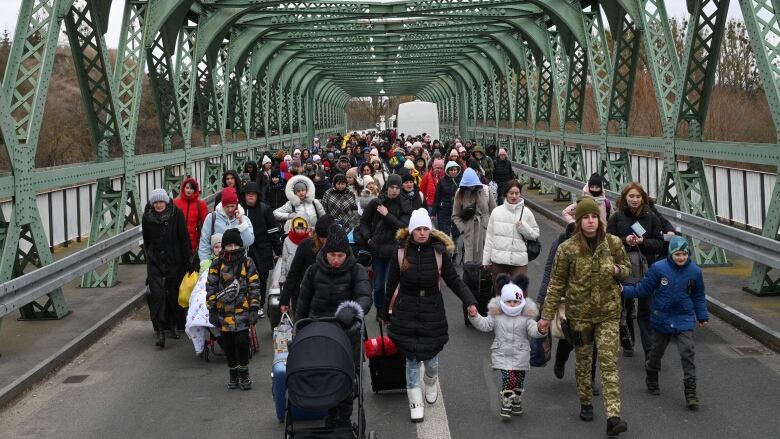
Hundreds of families seeking refuge in Canada from the war in Ukraine say a processing discrepancy at Canada's immigration department is breaking up households for months or keeping them stuck overseas in precarious living conditions.
Denis Kokhnosays he, his wife andteenage daughter applied together for their visas under the the Canada-Ukraine authorization for emergency travel program (CUAET) on June 1, 2022.
Nine months later, Kokhnoand his family are living in their fourthrefugee camp since fleeing to Germany, waiting for the last of their visas to fly to Canada.They received two out of three so far.
"I'm still waiting. And we are one family," said Kokhno, through an interpreter, from a shelter for asylum seekers in Hamburg. Kokhno is a Russian nationalwho says his family fled Russia in September because his Ukrainian wife's safety was at risk.
"We are not feeling comfortable here."
The family is one of hundreds who've banded together on Telegram andreached out to CBC News as a group. They've applied for their emergency visas and are left in limbo because their children or non-Ukrainian spouse are still waiting for their applications to move through Canada's immigration system, which isladen with delays and other bureaucratic issues.
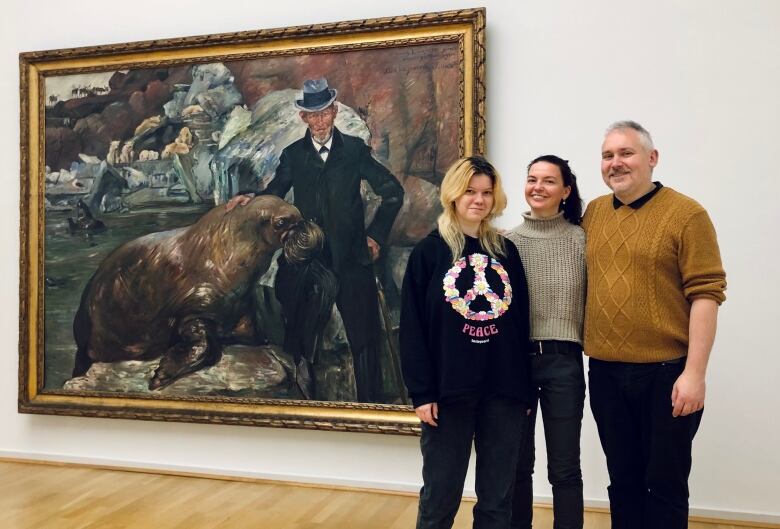
Immigration, Refugees and Citizenship Canada (IRCC) launched CUAET last March, promising a free andquick passage to Canada for Ukrainians affected by Russia's full-scale invasion of Ukraine a year ago.
The program offers families extended temporary status, allowing them to work and study until it's safe to return home.
Ukrainian nationals and their family members like a spouse, common-law partner or children are eligible to apply.
"The standard processing time for CUAET applications is 14 days, but complex cases may require a longer turnaround time," an IRCC spokesperson wrote in an email.
According to IRCC's data, more than 300,000 CUAET applications were still waiting for approval as of mid-February.
Scratching heads at illogical processing
But applicants like KokhnosayIRCC's failure to process visas for households together is illogical, tearing families apart, or leaving them scrambling to survive financially.
Some of the longest wait times among these families have stretched to more than 10 months as of Monday.
The group sent a letter to Immigration Minister Sean Fraser over a month ago and received an automated response. Applicants said they feel ignored by the minister, whose office did not comment for this story.
WATCH | What life is like living at a refugee shelter:
Kokhno said his family has to share aroomwith 12 people, there is a lack of proper ventilation and fire safety concerns, fights continue to break out, and pigeons enter living quarters and poop on clothes and food. The couple worries for their daughter who's currently unable to go to school.
"For me, the hardest [part]is to remain human and to love each other," said Kokhno.
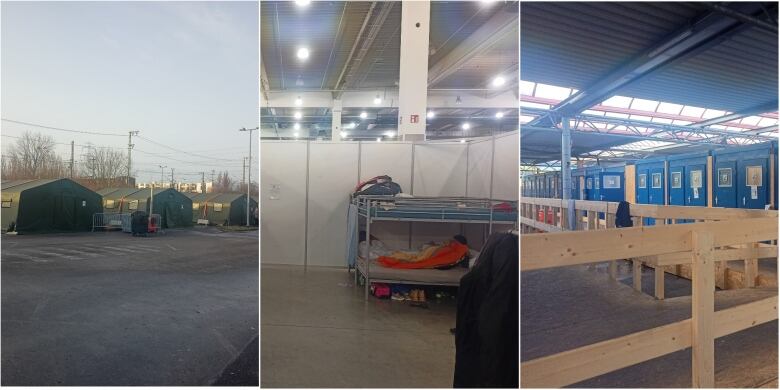
"For me, the hardest is the fear of rejection," said Maryna Derevianko, Kokhno's wife, in Ukrainian."If they, Canada, does not issue the visa for my husband, then ... we will have to stay in this shelter for a very long time."
Money running out for LGBTQ couple
Illia Shykotko and Nikita Denisenkoare temporarily staying in Bishkek, Kyrgyzstan, as they await the approval of Denisenko's CUAETapplication.
The couple who also lived in Russia when the full-scale invasion happened described submitting additional documents to prove their common-law relationship, as same-sex marriage is not legally recognized in Russia or Ukraine.
"The whole process is quite weird. Why we are applying as a family and then the officers are just splitting us up?" asked Denisenko, a Russian national, through an interpreter.
"It's completely silence. There is no answer," he added."We're just hanging in the air. We're spending all our savings."
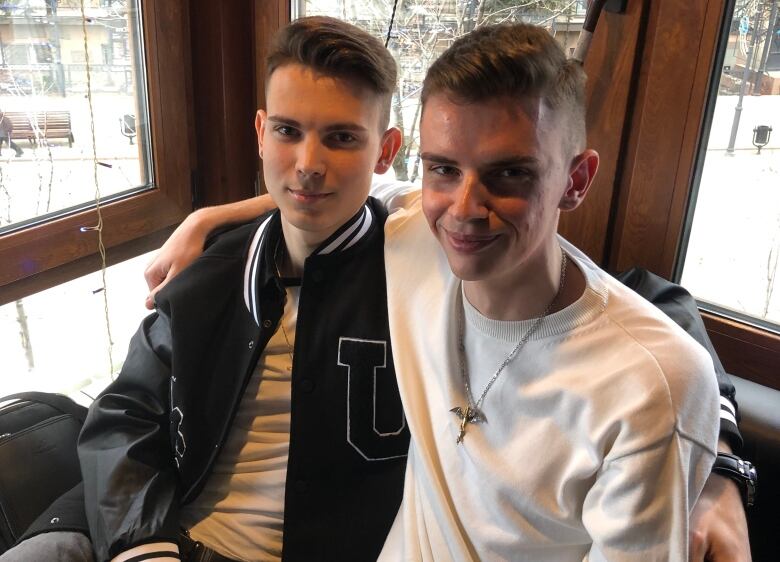
Shykotko says he's not willing to leave his partner behind to travel to Canada first, as that'll create more financial burdens for the two.
"We are not separating because we don't know how long we will have to wait," Shykotkosaid.
Wife waits for husband in Quebec
OlenaKazmagot her visa last August, but her Lebanese husband is still waiting.
Kazma joined her adult children in Canada in November, thinking her husband will be able to fly over soon from Lebanon. The family was in the process of finalizing their move toKharkiv, Ukraine, when the war escalated last year.
Months into the wait, Kazma spoke of her devastation of being separated from her partner of 32 years.
"I'm getting upset truly, really severely," she shared from Quebec, through an interpreter. "We have never ever been separated during our marriage."
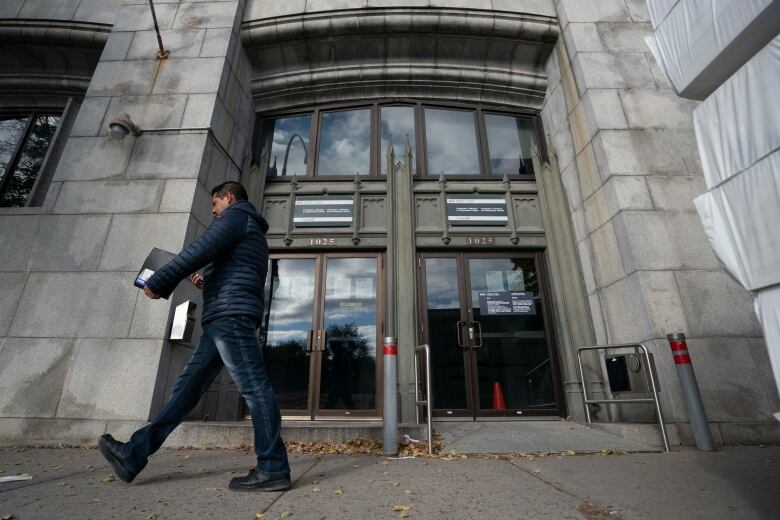
Kazma fears the possibility of a delay of another few months, and what that might do to her husband who's struggling, living alone amid anunprecedented economic crisis.
"I will not be able to leave my husband for longer," she said. "I will for sure go back to Lebanon."
IRCCdoesn't address discrepancy
IRCC declined CBC's request for an interview.
Instead, in an email, department spokesperson Michelle Carbertreiterated CUAET "is the fastest and most efficient way for Ukrainians and their families to come to Canada," yet did not directly address why there are months-long gaps in processing members of the same household.
Carbert saidall applications are assessed on a case-by-case basis.
CBC asked Minister Fraser's office to comment on these issues, and did not receive a response by deadline.
Here's the joint letter, signed by hundreds of families, and sent to Immigration Minister Sean Fraser in January.CBC has redacted the names and application numbers to protect applicants' privacy.
(PDF KB)
(Text KB)CBC is not responsible for 3rd party content













_(720p).jpg)


 OFFICIAL HD MUSIC VIDEO.jpg)
.jpg)



























































































